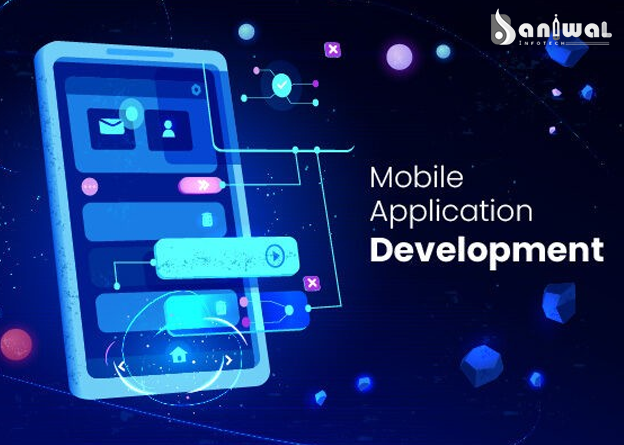
In today’s fast-paced digital era, businesses are continuously looking for ways to stay connected with their customers, improve their services, and streamline operations. Mobile applications have become essential tools in achieving these goals. This guide will take you through the essentials of mobile application development, its advantages, the process of choosing a development partner, and much more. Whether you’re a startup or a large enterprise, this guide provides insights to help you make informed decisions.
1. Introduction to Mobile Application Development
Mobile application development refers to the process of creating software applications that run on mobile devices like smartphones and tablets. These applications can be tailored to various operating systems, including iOS, Android, and Windows, and offer numerous benefits to businesses, such as enhanced user engagement, streamlined operations, and improved accessibility.
In recent years, businesses across industries have increasingly embraced mobile apps to enhance customer interactions, boost sales, and gain a competitive edge. Given the rapid pace of technological advancement, having a mobile presence is no longer optional but essential for businesses looking to succeed. Through mobile applications, companies can stay at the forefront of digital innovation and engage with their customers on a more personal level.
2. Why Mobile Apps Are Essential for Businesses
Businesses are now leveraging mobile applications for a multitude of purposes. These purposes range from enhancing customer experience to simplifying internal operations. Here are some of the main reasons mobile apps have become crucial for businesses today:
-
Improved Customer Engagement
One of the primary benefits of mobile applications is that they allow businesses to reach their customers directly. Unlike traditional websites, mobile apps can facilitate personalized communication through push notifications, real-time updates, and customized recommendations, which ultimately improve customer satisfaction. -
Increased Sales and Revenue
Mobile applications simplify the purchasing process and offer customers a seamless shopping experience. With features such as one-click purchasing, secure payment options, and integrated user accounts, mobile apps streamline transactions, making it easier for customers to complete their purchases. This convenience often translates into increased sales and higher revenue. -
Enhanced Brand Visibility
A mobile app serves as an additional marketing tool that constantly reminds customers of the brand. Unlike traditional forms of advertising, a mobile app remains on the user’s device, providing consistent exposure to the brand. By designing an engaging app interface and using creative promotions, businesses can attract new customers and enhance their visibility in the market. -
Data Collection and Analysis
Mobile apps enable businesses to collect valuable customer data, providing insights into user behavior, preferences, and trends. By analyzing this data, businesses can make data-driven decisions, enhance their offerings, and personalize experiences. This ability to gain insights into customer behavior is essential for developing effective marketing strategies and improving customer satisfaction. -
Competitive Advantage
In many industries, having a mobile application provides a competitive edge. Businesses with a user-friendly app stand out in the market, attracting tech-savvy customers and positioning themselves as forward-thinking. With the right features, a mobile app can differentiate a brand from its competitors, providing an advantage in an increasingly competitive digital landscape.
Also Read: Top 12 Things Customers Expect from Your Online Store
3. Choosing a Mobile App Development Company
When embarking on a mobile app development project, one of the most critical decisions is choosing the right development partner. A skilled Mobile App Development Company can make the difference between a successful product launch and a disappointing one. Here are some factors to consider when selecting a development company.
-
Experience and Expertise
Experience is one of the most crucial factors when selecting a development company. A company with a proven track record is more likely to deliver a high-quality product. Evaluate the company’s portfolio to ensure they have experience in your industry or with similar projects. Also, check if the team has expertise in the specific technologies you need for your app. -
Range of Services
An ideal mobile app development company offers end-to-end services, from conceptualization and design to development, testing, and post-launch support. Choosing a company that provides all services under one roof can simplify the development process, ensuring a more cohesive and streamlined experience. -
Technical Skills
Ensure the company has expertise in the latest technologies and platforms, such as iOS, Android, and cross-platform development frameworks like Flutter and React Native. The technical skills of the development team can significantly impact the app’s performance, functionality, and security.

Mobile App Development Company in India
India has emerged as a global hub for mobile app development, offering high-quality services at competitive rates. Many companies in India have a skilled workforce proficient in a range of technologies, making it a popular choice for businesses worldwide. By partnering with a Mobile App Development Company in India, businesses can access a pool of talented developers who can deliver high-quality, customized solutions at affordable rates.
One such company is Baniwal Infotech, a trusted partner in mobile and web application development. With a focus on innovation, quality, and customer satisfaction, Baniwal Infotech helps businesses turn their ideas into powerful digital solutions that resonate with their target audience.
4. The Mobile App Development Process
Developing a mobile application is a structured process that involves several stages. Here’s an overview of the steps typically involved in mobile app development:
-
Step 1: Idea Validation and Market Research
Before development begins, it’s essential to validate the idea and conduct market research. This phase includes identifying the target audience, analyzing competitors, and understanding user expectations. Validating the concept ensures the app has a viable market and addresses a real need. -
Step 2: Requirement Gathering and Planning
In this phase, the development team works with the client to define the app's requirements, set goals, and create a roadmap. Detailed planning helps avoid misunderstandings and ensures that everyone is on the same page. -
Step 3: UI/UX Design
By adding detailed product pages, you can give upfront details about your products and services. This way they can do informed decision making and be sure about the product or service decreasing the product return rate. A well-designed interface and seamless user experience are key to a successful app. Designers create wireframes and prototypes to ensure the app is visually appealing and easy to navigate. User experience is a critical factor in app success, as a poorly designed app can drive users away. -
Step 4: Development
During this phase, developers write code to create the app’s functionality. Development may include backend and frontend coding, depending on the app’s requirements. The development stage can be complex, and it’s essential to have skilled developers to handle potential challenges. -
Step 5: Testing and Quality Assurance
Testing ensures the app functions as expected and is free of bugs. Quality assurance teams conduct various tests, such as functional testing, usability testing, and security testing, to ensure the app is reliable and secure. Rigorous testing minimizes the risk of errors and improves user satisfaction. -
Step 6: Launch and Deployment
Once the app is tested and approved, it’s ready for launch. The app is submitted to the relevant app stores, such as Google Play and Apple’s App Store, for review and publication. During this phase, it’s essential to adhere to store guidelines to avoid delays in approval. -
Step 7: Post-launch Support and Maintenance
After launch, the app requires ongoing maintenance and updates to fix bugs, enhance features, and ensure compatibility with new OS versions. Regular updates help keep the app relevant and improve user satisfaction over time.
Also Read: Grow Your Fintech Business: Take it Forward with a Mobile App
5. Technologies Used in Mobile App Development
The technology stack is crucial to the app’s functionality, performance, and security. Here are some of the common technologies used in mobile app development:
-
iOS and Android Development
For native app development, iOS developers use Swift and Objective-C, while Android developers use Java and Kotlin. Native development provides a high level of performance and access to device-specific features, making it ideal for apps that require intensive processing or sophisticated user interfaces. -
Cross-Platform Development
Cross-platform frameworks, such as Flutter and React Native, allow developers to create apps that run on both iOS and Android from a single codebase. This approach reduces development time and costs while maintaining a consistent user experience across platforms. -
PHP Web Application Development
For backend development, many mobile app development companies use PHP, a robust server-side scripting language widely used for web application development. PHP powers dynamic content and supports databases, making it a great choice for handling backend processes in mobile applications. PHP’s popularity stems from its ease of use, scalability, and extensive support for frameworks such as Laravel, CodeIgniter, and Symfony.
Baniwal Infotech specializes in PHP web application development, providing businesses with a powerful backend that supports their mobile applications seamlessly. The company’s PHP expertise ensures secure, efficient, and scalable web applications that align with mobile app requirements.
6. Benefits of Partnering with Baniwal Infotech
Baniwal Infotech is a renowned Mobile App Development Company in India, known for its expertise in mobile and web application development. Here’s why businesses choose Baniwal Infotech:
-
Comprehensive Services
Baniwal Infotech offers a full suite of services, from mobile app development to PHP web application development. Their team of skilled developers and designers ensures high-quality results at every stage of the project. The company’s comprehensive services make it easy for clients to manage all aspects of app development. -
Experienced Team
With years of experience in the industry, Baniwal Infotech has a team of seasoned professionals who stay updated with the latest technology trends, providing businesses with innovative solutions that meet their unique needs. -
Customized Solutions
The company understands that each business is unique, with different goals and requirements. Baniwal Infotech takes a tailored approach, working closely with clients to develop custom solutions that align with their business objectives.


.jpg) Sales Office (Canada)
4 Kings Cross Road
Sales Office (Canada)
4 Kings Cross Road Sales Office (UK)
30 Victoria Terrace
Sales Office (UK)
30 Victoria Terrace Development Office (India)
Office Number: 406, 4th floor, Tower B, iThum, Sector 62, Noida, Uttar Pradesh 201309 (India)
Development Office (India)
Office Number: 406, 4th floor, Tower B, iThum, Sector 62, Noida, Uttar Pradesh 201309 (India) Sales Office(USA)
Sales Office(USA)




